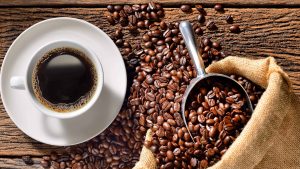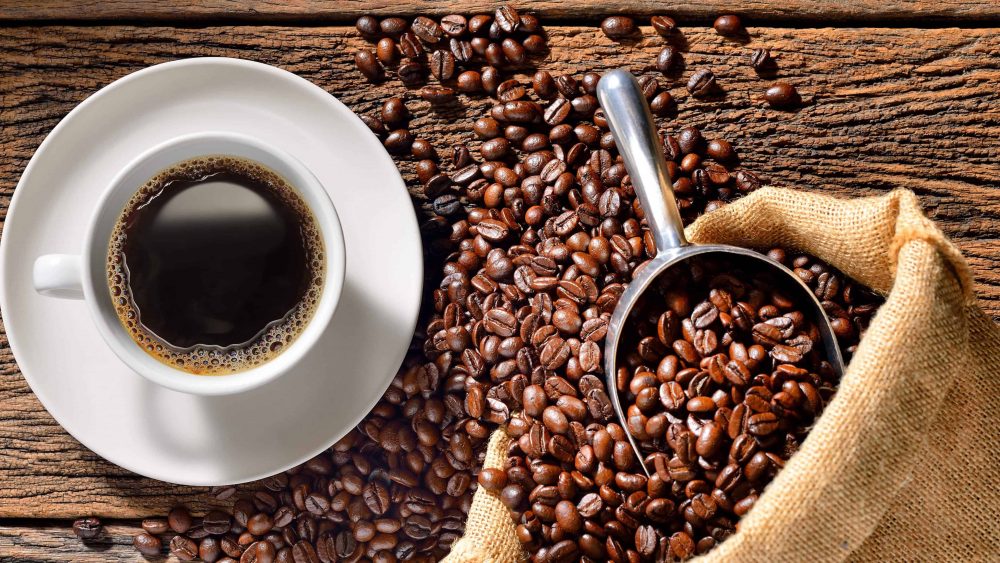 As a societal norm and American obsession, the topic on caffeine in regards to our health can be a loaded subject. The US has been reported as the highest consumer of coffee beverages, with an incredible 83% average of adults that are reported coffee drinkers (according to the National Coffee Associations 2013 survey). Although there has been some recent optimistic health benefits reported on the consumption of caffeine (and coffee), it seems to be a dwindling hope when compared with the long list of negative effects this stimulating substance provides. In this article I hope to speak on these effects (both good and bad), while diving into the subject from a more traditional Eastern point of view.
As a societal norm and American obsession, the topic on caffeine in regards to our health can be a loaded subject. The US has been reported as the highest consumer of coffee beverages, with an incredible 83% average of adults that are reported coffee drinkers (according to the National Coffee Associations 2013 survey). Although there has been some recent optimistic health benefits reported on the consumption of caffeine (and coffee), it seems to be a dwindling hope when compared with the long list of negative effects this stimulating substance provides. In this article I hope to speak on these effects (both good and bad), while diving into the subject from a more traditional Eastern point of view.
Caffeine comes in many different forms. There’s coffee at the top of the list, black tea, green tea, white tea, mate (sometimes called matiene), chocolate/cacao, soda pop, kombucha, energy drinks, certain medications and any food or beverage that contains these substances. No matter the form, caffeine’s side effects can come into play, especially for those that metabolize caffeine at a slower rate, making them more sensitive to even small amounts. Although coffee is typically considered the main caffeine source, consuming too much tea, chocolate or any other caffeinated food or beverage, may increase imbalance in the system just the same.
Researching this subject on the “good and bad” of caffeine, made me a bit dizzy. One source is telling me that caffeine is good for headaches, while another states that it is the cause. One source states that it boosts the memory and another states it depletes it. One article says that caffeine will prevent stroke and another claims it causes them. With so many conflicting “facts” on caffeine and its side effects, we really need to take a step back and see how our own bodies react to the caffeine, and if it is serving us in our health and our daily life.
After reading numerous articles on the effects of caffeine, it seems to me like most of the “positive” effects are short-term and therefore short lived (i.e. improved memory, headache relief, improved alertness), while the negative effects are longer term and longer lasting (i.e. vasoconstriction, hyperacidity, decreased digestion, malabsorption of nutrients, etc). For example, I find it hard to believe that caffeine will help conditions such as erectile dysfunction and headaches, when it is a well-known vasoconstrictor which is the exact cause of both of these disorders.
Although the negative effects of caffeine seem to outweigh the positive, in the end it still comes down to several factors including the individual as a whole (prakrtti), their current state of imbalance (vikrtti), the amount caffeine being consumed, the form of the caffeine (e.g. white tea compared to a sugary energy drink) and how it is being consumed (i.e. time of day, empty stomach, etc). So as with all things in Ayurveda, it is best to look at the entire picture before we can really discover the effects of the situation.
An Ayurvedic Perspective
Ayurveda clearly states that caffeine is tri-doshically disruptive, meaning it will increase Vata, Pitta and Kapha; meaning it is indeed harmful for every-body. I do have to agree with this concept, however, in my personal experience it seems to be a relative notion. For example, if a client of a Vata nature comes to see me with symptoms of hypersensitivity, anxiety, restless mind and restless sleep; I will likely ween them off of caffeine as quick as can be. If another individual comes to me with hyperacidity, inflammatory arthritis and hypertension, once again I will immediately put them on a gentle caffeine detox program. But if an individual comes to me with unrelated conditions and is only drinking 1-2 cups daily before noon, this is not the first issue to address (although eventually it may come into the healthcare plan after dealing with other main concerns).
Negative Effects of Caffeine on Vata Dosha
- Increases anxiety, fear and nervousness
- May cause jitteriness, shakiness, dizziness and muscle tremors
- Sets off the fight or flight mode
- Causes restless sleep and insomnia
- Decreases digestion
- May cause gas and bloating
- Causes vasoconstriction in the body (poor circulation)
- Causes vasoconstriction to the brain (one study shows by 27%), reducing long-term cognition, memory and focus
- May cause accelerated or irregular heartbeat
- Causes excessive calcium to be flushed out of the system (via the urine), potentially leading to brittle bones and osteoporosis
- Negatively effects the absorption of zinc, magnesium, iron and other minerals
- Overuse may promote dehydration and dryness in the body
- Taxes the adrenals, with potential to worsen or cause adrenal fatigue
Negative Effects of Caffeine on Pitta Dosha
- Increases blood pressure for up to 2-3 hours after consumption
- Increases irritability, frustration, anger and short temper
- Taxes the liver
- Increases heat in the body
- Increases inflammation in the body
- Causes gout flare-ups
- Irritates the GI tract and worsens conditions such as IBS, Crohn’s disease and ulcerative colitis
- May create excessive heat in the bladder and can worsen UTI symptoms
- Overuse may lead to headaches or migraines
- Interferes with neurotransmitters that govern mood and stress
- Causes loose stools or diarrhea (mrdu koshta) by increasing peristalsis and leading to malabsorption of vital nutrients
- May cause hypoglycemia (low blood sugar) in some individuals
- Overuse may cause hyperacidity, heartburn and gastric ulcers
- Overuse may cause sour stomach, nausea and vomiting
Negative Effects of Caffeine on Kapha Dosha
- Taxes the kidneys and bladder
- Overuse may lead to fibrocystic changes in the breast tissue
- Increases appetite
- Decreases digestion
- Releases the stress hormone cortisol, a leading cause of midsection weight gain
- Impairs glucose metabolism and is not recommended for anyone with Type 2 diabetes
- Causes polyuria (increased urination)
General Negative Effects of Caffeine
- Overuse may cause hormonal imbalance
- Increases PMS symptoms
- May cause urinary incontinence or worsen a preexisting condition
- May reduce fertility in females by as much as 27%
- Worsens menopausal symptoms (hot flashes, mood swings, etc)
- Increases the release of the stress hormones cortisol, epinephrine and norepinephrine
- Coffee contains high levels of Acrylamide, a known carcinogenic; the darker the roast, the higher the Acrylamide levels
- Addictive, creates physical dependency
- May cause mania in Bipolar Disorder
- May negatively interact with medications such as antibiotics, thyroid medication, psyche meds and depression drugs
The positive effects of caffeine to me seem mostly unreliable, counterintuitive (i.e. caffeine is good for tinnitus), and unsupportive by data or even logic. The positive effects that do hold up will most definitely have a healthier alternative with the same effect. For example, although it is claimed that caffeine wards off Alzheimer’s disease, it has been clinically proven that turmeric will have the same effect; all while cleansing the blood, strengthening the liver, reducing inflammation and increasing digestion. Similarly coffee is said to be a good source of antioxidants, although I am fairly sure a handful of blueberries will provide a larger dose of these nutrients without any of the negative side effects.
(My) Conclusion
Although I personally am not a huge fan of caffeine in general, it is not necessarily a black and white issue. If an individual has been drinking four cups of coffee for 20 years and has been able to tone it down to 1-2 cups of green tea in the morning, this is a great compromise. If someone is drinking caffeinated beverages of any kind all day long and is able to cut down to one cup a day (ideally before noon), once again this is an immense improvement.
In the end, it may be best to keep caffeine as a weekly or better yet, monthly treat; but this will take some time to get used to. It is best to ween off of caffeine diligently and willfully, but also with gentleness and compassion. If you have acquired a lifelong habit, this takes time to come off of. In fact, quitting cold turkey may lead to intense withdrawal symptoms that may be harmful to the body (i.e. fatigue, nausea, headaches). It is best to ease into it with a weening process by slowly reducing the amount of caffeine being taken in.
You can replace the coffee with tea; make your average 4 daily cups turn into 1-2; or cut down a cup of coffee each week until you are able to hit zero. You can also help to neutralize the negative caffeine effects by adding spices such as cinnamon or cardamom to your tea or coffee while you are in the weening process. I also suggest replacing caffeinated beverages with herbal teas such as brahm tea, tulsi tea, or blends such as my invigorating OM Shanti tea or delicious Ayurvedic Spiced Chai. These will help to balance the withdrawal symptoms you may experience during the detaching phase.



from personal experience, I can say that caffeine definitely disrupts a lot of things in my body. Same as caffeinated teas, alcohol and other substances. When I avoid them, my body has a much better balance.
Hi Josh,
Thank you for your comment! I completely agree with you and have had the same experience. It is hard to see how much a substance really is effecting you until you are able to remove it from the system completely. All of these substances you mention only give temporary relief to our problems, but then often leave us feeling worse than before. There are so many other ways to get energy and boost the mood that don’t leave you crashing, hung over or dependent. I am glad you have been able to find balance through natural means. Thanks again for sharing!!
Namaste, Danielle
Danielle, thank you for the article.
Although I agree with the negative side-effects and would be glad to start my day without green tea, it has been very hard for me to find a reliable substitute that cleanses my liver in the same way. I use bitter spices like cumin, turmeric etc. regularly, I eat lots of leafy greens (especially dandelion), but none of it seems to clean my blood as well as green tea does. In fact, it was only when I started adding green tea back into to my diet that my system started working better. I am a Pitta-Vata type, so I do acknowledge the cumulative disruptive effect it has on my body. However, my liver and my blood, and accordingly my mind, seem to be working like that of a Kapha person, and it seems impossible for me to figure this out.
Hi Laura,
Thank you for writing in. I imagine you are not alone in your feelings around the green tea (or caffeine in general). Although green tea is not the worse substance to be habituated with, it can take a toll on your adrenals, liver, digestion and doshic balance overtime. Caffeine is a fairly potent laxative, which is why it seems to stimulate digestion and elimination. However, this laxative effect creates dependency (which is what you seem to be experiencing) and will lead to stagnation in the GI tract/colon when you try to stop taking it. Caffeine also can cause reduction in peristaltic movement in the colon causing atrophy of these muscles and resulting in longterm constipation.
Caffeine also creates dependency in terms of energizing the mind and when trying to eliminate the caffeine from your daily life, the result is often extremely low energy until it is completely out of the system and balance has been restored. Until then it can definitely be a rough battle. It seems like the caffeine is simply acting as a bandaid for a potential Kapha imbalance that you may be experiencing in the mind and digestion. In order to truly gain back your energy, etc in a natural way, you will need to address this imbalance and remove any of the causes that may be contributing to it.
This is simply my interpretation in a nutshell. Of course it is hard to see the full picture without more information, but this would be my view on what you have shared. I hope it helps a bit!
Namaste,
Danielle
Hi Danielle,
What about decaf coffee? I am a pitta -Vata & I have a decaf latte (with whole milk) in the afternoon 1-3 x week in winter. Don’t feel any effects of caffeine but wondering what other effects it’s might have long term. Thanks!
Hi Anna,
Thank you for your question! Decaf coffee is not exactly recommended either. It is still very heating and acidic for Pitta, and from what I understand, the process that the coffee beans goes through in order to become decaf is not necessarily good for you. On the plus side, having the latte with whole milk and in the winter will make it slightly more balanced for your Pitta.
I would ultimately recommend to cut back to once every week or two (or less), and replace the other drinks with a warm cup of caffeine-free chai. If you are interested, we have a recipe you can find here! I hope this helps. Be well:)
Namaste,
Danielle